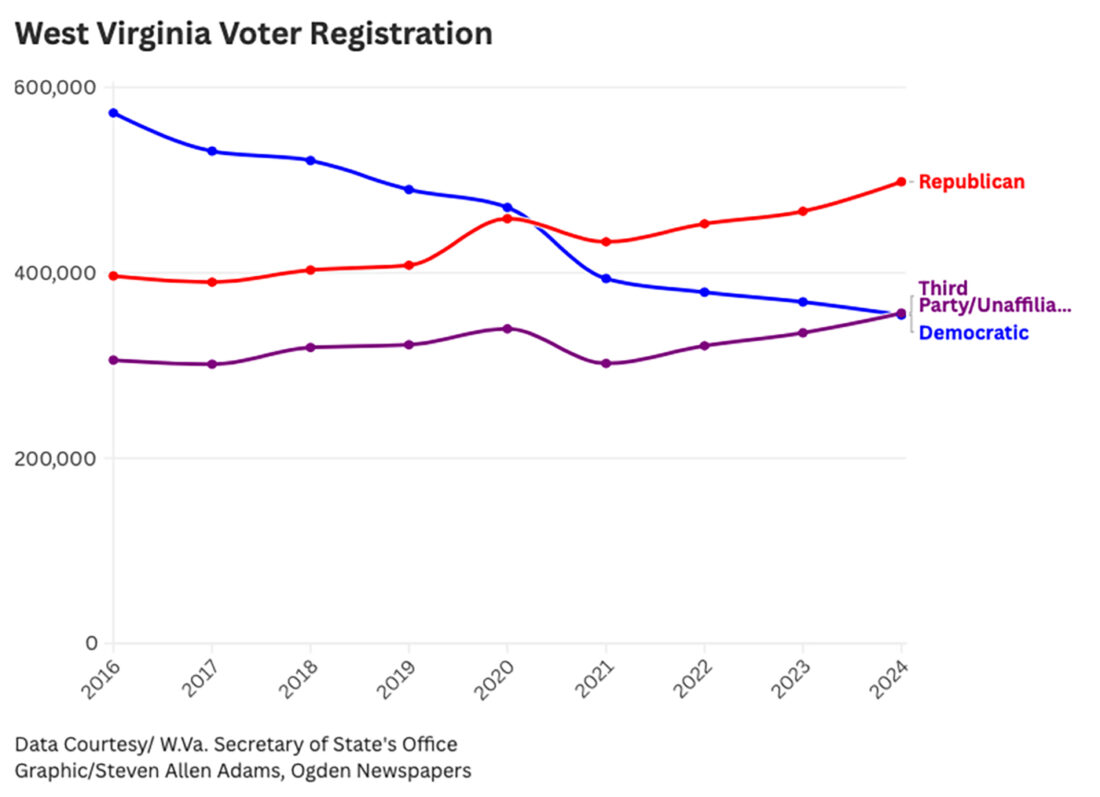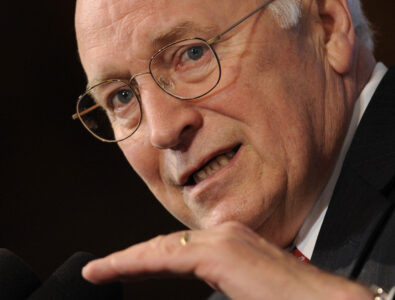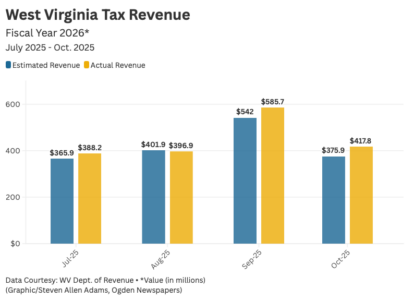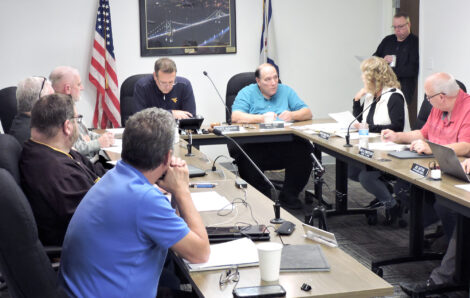Red vs. Blue: Republican voter registration continues to grow in West Virginia

CHARLESTON — As voters head to the polls in West Virginia beginning next week, Republicans continue see growth in the plurality of voters registered with the GOP statewide and in a majority of the state’s 55 counties, though state Democratic Party officials are not giving up on numbers turning back their way in the future.
The voter registration deadline for the general election in West Virginia was Tuesday, though voter registration applications postmarked by Oct. 15 can still be accepted by county clerks. Early voting begins Wednesday, running through Nov. 2 excluding Sundays. Voters can also cast their ballot on Election Day on Nov. 5.
According to preliminary voter registration data from the West Virginia Secretary of State’s Office, 1,209,161 West Virginians are registered to vote in the state and eligible to vote in the 2024 general election. The Republican Party has 498,230 registered voters, representing 41.2 percent of West Virginia’s total number of registered voters. The Democratic Party has 354,462 registered voters, or 29.3 percent of registered voters.
“The West Virginia Republican Party continues to experience unprecedented growth and involvement as we gear up for a crucial election in just a couple weeks,” said Matt Herridge, chairman of the West Virginia Republican Party. “Evidenced by adding 10,000 new Republican voters in just the last six weeks, we can feel the momentum — and we’re still putting in the work to win up and down the ballot on Nov. 5.”
As of Wednesday, the total number of unaffiliated voters and third-party registered voters now exceeds the number of registered Democratic voters, with 302,156 voters – or 25 percent of registered voters in the state – unaffiliated with any party. Another 10,895 registered voters (1 percent) are affiliated with the Libertarian Party, 2,646 registered voters (0.2 percent) are affiliated with the Mountain Party, and 40,772 registered voters (3.4 percent) are affiliated with other political parties.
According to the 1933 West Virginia Blue Book, Republicans held the majority of voter registrations going into the 1932 primary elections. But by the time the next Blue Book was published, the majority of voter registrations flipped to the Democratic Party for the 1934 primaries.
In February 2021, following the defeat of former Republican President Donald Trump and certification of the 2020 presidential election for Democratic former U.S. Senator and Vice President Joe Biden, the Republican Party regained the majority of voter registrations for the first time in 86 years.
“West Virginians embrace the Republican Party’s support of faith, family, and freedom — but beyond that, voters realize the Republican Party also offers better solutions on another critical issue: financial security,” Herridge said. “Republican leaders continue to fight for these principles, and we always welcome new voters to our party who share these values!”
A review of voter registration numbers available from the Secretary of State’s Office going back to 2016 shows a steady decrease in Democratic voter registration over the last nine years. But after Trump’s defeat in 2020, Democratic registration took a sharp drop and Republican Party registration took a sharp increase between October 2020 and October 2021 before returning to a steady decline, with third party/unaffiliated voter registration rising steadily since 2021.
Del. Mike Pushkin, D-Kanawha, the chairman of the West Democratic Party, placed part of the blame for the decrease in Democratic voter registrations on shrinking population numbers in the state. Pushkin said rhetoric from GOP leaders in the state has pushed people to leave, affecting both the Democratic and Republican parties.
“Last year, (former) Republican Party Chair Elgin McArdle openly told people considering a move to West Virginia that if their views ‘don’t conform’ to the Republican version of West Virginia values, they shouldn’t come here,” Pushkin said. “Unfortunately, many people have taken her up on that sentiment. West Virginia is one of only two states to lose population in the last census, and the consequences are clear. We don’t have enough certified teachers, child protective service workers, advanced manufacturing workers, and other critical personnel.
“Republican policies and priorities have left us unable to compete with salaries in other states, driving talented workers and young people elsewhere,” Pushkin continued. “The rhetoric from Republican leadership – essentially saying ‘if you don’t think and act the way we do, you’re not welcome here’ – has made it even worse. Is it any wonder that so many, particularly the young, are voting with their feet and seeking their future someplace else?”
BY THE NUMBERS
Samuel Workman, director of the Rockefeller Institute for Policy Research and Public Affairs at West Virginia University, said the growth in Republican Party voter registration was driven by support for Trump and disappointment in Biden’s election, while the growth of unaffiliated voters is due in part to some traditional Republicans leaving due to concern about Trump and Democrats leaving but not yet willing to switch to Republican.
“A lot of these trends we’re seeing are partisan sorting and the jettisoning of some voters from parties because of this sorting,” Workman said. “So, in both ways, the sorting is both long-term, but it becomes very visible in this time period, 2016 to 2024, in part because Republicans had a presidential candidate and a president who galvanized those stark differences between the parties.
“There is no doubt that in that third-party or unaffiliated group there are Democrats who know that their vote matters most in Republican primaries,” Workman continued. “There’s no doubt that there are people in there who are maybe old-school fiscal Republicans who don’t like the new sort of social issue orientation of the current Republican Party.”
Taking a look at all 55 counties, Republicans now lead in voter registration in 47 counties. New Republican counties since 2023 are Summers, Kanawha, Webster, Wetzel, Wyoming, Brooke, Clay, Fayette, Lincoln, and Randolph counties.
The only counties with majority Democratic voter registrations are Boone, Braxton, Gilmer, Logan, Marion, McDowell, Mingo, and Monongalia counties. But of those eight counties, Webster, Braxton, Gilmer, Marion, and Monongalia, counties are on a glide path to becoming majority Republican voter registration counties in the near future. But Logan and McDowell counties remain rock-ribbed Democratic counties, having the lowest Republican Party voter registrations of all 55 counties.
Workman said most of the Southern coal fields remain loyal to the Democratic Party due to the labor history of the region, combined with issues of economics and poverty that some believe Democratic lawmakers at the state and federal level have better answers for.
“If we were to make a map of severance tax revenues by the counties, you would see that map clusters around those counties in the southern coal fields that still are at the margins of majority Democratic registration,” Workman said. “And of course, that’s the legacy of coal and coal jobs and probably still a lingering sort of affinity and affiliation for labor.
“The other thing that’s going on there is those places, especially if we talk about a place like McDowell County, is they’re having a lot of very difficult issues in the transition away from coal,” Workman continued. “So, poverty, very low population, very real public service needs that in general, folks tend to look at the Democrats as doing slightly better on.”
Other Southern counties, such as Fayette County, only recently became Republican. Workman attributes the recent change to a focus by Republican officials on tourism as economic development in those regions.
Workman pointed to efforts by Gov. Jim Justice on improving state parks, and the efforts by U.S. Sens. Shelley Moore Capito, R-W.Va., and Joe Manchin, I-W.Va., to redesignate the New River Gorge National River as the New River Gorge National Park and Preserve.
“That area is becoming the center of tourism and the recreational economy,” Workman said. “Voters there have actually really, at least in a public way, been more partners with Republicans than in opposition to them…The issues that dominate in those counties don’t have clear linkages to party.
“When I think of the places Democrats still have an advantage, it is a legacy advantage mostly to coal,” Workman continued. “And in the places where we see them slipping a little bit in part, it’s because the issues that animate the economy in those counties aren’t really ones that animate partisan conflict between the parties.”
FULL CIRCLE
While Republicans have led in voter registration for nearly four years, voters in the state had slowly begun warming to electing Republicans despite the state’s majority Democratic voter registration between 1934 and 2020.
For example, while West Virginia was a blue state, voters have supported every Republican nominee for president since George W. Bush in 2000. The state’s delegation in the U.S. House of Representatives went fully GOP in 2014. Capito, who was first elected to the U.S. House in 2000, succeeded a retiring Democratic Jay Rockefeller in the U.S. Senate in 2014.
Also in 2014, the Legislature went majority Republican for the first time in 83 years, growing to supermajority status six years later. Justice switched parties in 2017 to Republican after being elected as a Democrat. The remainder of the Board of Public Works went to Republicans after Democratic State Treasurer John Perdue was defeated by former Republican state lawmaker Riley Moore. But the Democratic Party held the statewide majority in voter registration that entire time.
Workman said he expects Republican advantage in voter registration to continue, but it is possible that political opinions could change before those changes trickle down to voter registration.
“I think there will be some change. Registration usually lags a lot of other stuff,” Workman said. “So, if Republicans have a registration advantage, that’s going to likely endure beyond a lot of these changes.”
It also remains to be seen what happens with Republican Party voters once Trump is no longer a player on the political scene. While Trump remains popular in West Virginia and could easily claim the state’s four votes in the electoral college, polling shows Trump and Democratic Vice President Kamala Harris close or tied in several battleground states.
If Trump loses the presidential contest for a second time and chooses to retreat to his Florida estate and abandon politics, Workman said that could cause problems in the future for the Republican Party in West Virginia when it comes to getting out the vote.
“We normally think in political science of turnout as favoring Democrats on balance – not always, but on average. And that kind of flipped a bit with former President Trump. He has an ability to turn folks out to the polls that is unique,” Workman said.
“If I were a state party operative, I might be a little bit concerned that if former President Trump loses the election, where does that enthusiasm come from moving forward that gets those new Republican registrants – some of whom we’re assuming switched from Democrats, but some of them might not have voted before – what gets them up and out to the polls,” Workman continued. “What candidates do we see out there on the national ticket or the state ticket that are able to marshal that same sort of drive to turn people out?”
In the meantime, Pushkin said leaders in the state Democratic Party are not discouraged or dismayed by the latest voter registration numbers. He said the Democratic Party will continue to push a message that the party is still the party of prosperity for all.
“Democrats are fighting to offer a better vision for West Virginia, one that includes everyone, values diversity of thought, and invests in the workers and infrastructure needed to keep our state thriving,” Pushkin said. “We can turn this around by focusing on inclusion and opportunity while passing budgets that invests in West Virginia’s future.”
Special thanks to Patrick Doyle of 90.5 WESA for his assistance with this story.




